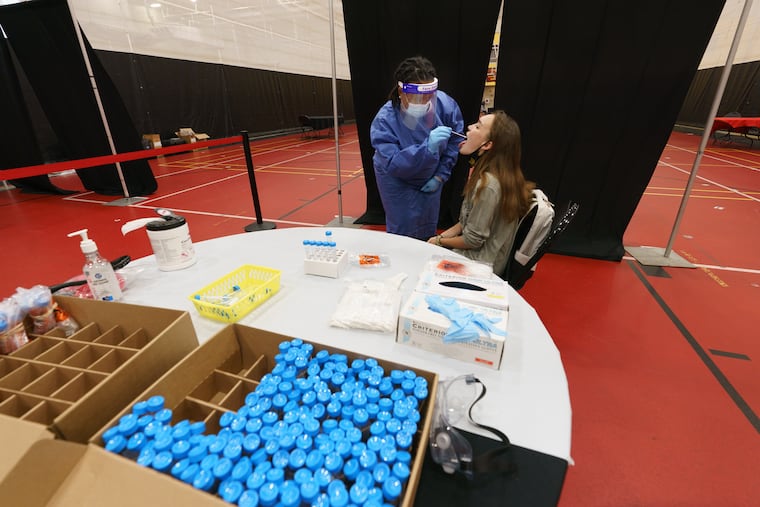Even with the delta variant, Ursinus College expects a better fall with a mostly vaccinated campus
Ursinus College last fall adopted one of the most aggressive COVID-19 testing policies of area colleges as it tried to keep the virus off its campus. What will the school do this year?

Ursinus College last fall adopted one of the most aggressive COVID-19 testing policies of area colleges as it tried to keep the virus off its campus.
All 1,180 students living on the small liberal arts college campus in Montgomery County were tested every week. Still, the school experienced 40 cases in the fall and 151 in the spring.
College officials are expecting a better fall than last year, even with the more transmissible delta variant and all 1,500 students on campus with no options for remote or hybrid learning like last year. That’s largely because the college expects that more than 90% of staff and students will be vaccinated, if early survey results are any indication.
» READ MORE: At Ursinus College, all students are tested for the coronavirus every week
But, Mark Schneider, dean of the college and chair of the school’s coronavirus task force, said that won’t be quite enough to protect Ursinus.
“A high level of vaccination is essential, but a high level of vaccination is probably not enough to guarantee that you’re not going to have significant infections on campus,” Schneider said.
And some of those infections, he said, could be among vaccinated students.
That’s why Ursinus will require all students to be tested before they arrive, and the college will test unvaccinated students every week during the semester, just like last year. Vaccinated students will be tested less frequently, about once every three weeks, Schneider said. The college also is planning to require masks in indoor classrooms for everyone at least for the first few weeks. And it will continue to contact trace and quarantine students as necessary.
“We found last year, the continual testing of the campus gave us great insight into … the areas of concern,” he said, and the overall health of the campus.
» READ MORE: The vaccination debate on college campuses. A mandate or not?
At a state forum for college administrators, Schneider recently shared what Ursinus learned from operating during the pandemic last year. Early on, college officials thought they could isolate Ursinus and keep the virus out, but found that wasn’t the case.
“It’s just almost impossible to do that,” he said, given that the college is in a suburban community — the Borough of Collegeville, with 5,500 residents — and close to attractions in Philadelphia.
Like other schools, Ursinus found that the virus spread from student social interactions rather than in the classroom, he said.
The college is requiring students to be vaccinated with exemptions for religious and medical reasons. As of last week, about 1,150 of Ursinus’ 1,500 students answered the college’s question about vaccination, and 97% of those said they were vaccinated, Schneider said. About 85% of faculty also have indicated they are vaccinated, he said.
“If that rate continues, the likelihood is we will be well above 90%,” he said.
Ursinus mostly draws from Pennsylvania, Delaware, New Jersey and Maryland, Schneider said. So it won’t be bringing lots of students in from far-flung locations. Officials expect only a couple, if any, cases to arrive on campus at the start of the semester later this month, he said.
The college plans to resume athletics and many of the other activities so important for a vibrant student life. And students will be in classrooms, Schneider said. Ursinus’ aggressive testing plan will allow the school to keep close tabs on any virus present and act if concerns arise, he said.
Testing students will be a less expensive venture for Ursinus this year. The college spent about $1 million on testing last academic year when each test ran about $150. This year, it will be in the few tens of thousands, Schneider said, as tests now cost $5 to $10.